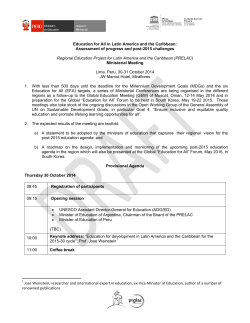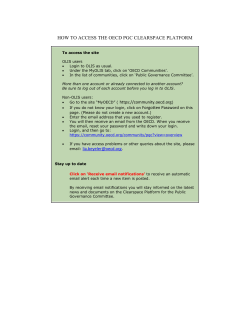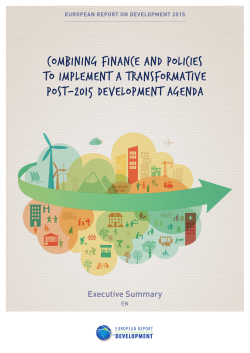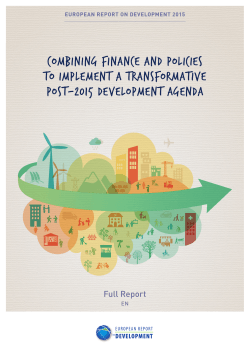
Concept Note and Agenda - Global Partnership for Effective
2015 Global Forum on Development Preparatory Session – Concept Note The role of ODA and broader official development finance in the post-2015 era: creating opportunities for “smarter” official finance Tuesday 31 March 2015 3:30 pm – 5:30 pm OECD CONFERENCE CENTRE, Room CC5 The post-2015 sustainable development agenda will require the mobilisation of a wide array of domestic and international resources from both public and private actors. In order to identify the right tools, policy frameworks, benchmarks and incentives needed to accelerate resource mobilisation for achieving and implementing the Sustainable Development Goals (SDGs), key dimensions of the financing puzzle must come together in order to fully benefit from all possible opportunities, options and synergies. While Official Development Assistance (ODA) will remain a crucial part of international development co-operation, particularly for countries most in need, a much stronger role for finance above and beyond ODA, including private capital, will be needed for a successful post-2015 agenda. Many stakeholders are currently working on thinking through how the financing architecture can best be mobilised in support of this agenda. In light of the upcoming Third International Conference on Financing for Development in Addis Ababa, on 13-16 July 2015, the Global Forum on Development organised by the OECD will offer a timely opportunity to discuss what role official development finance, including ODA, can play in the post-2015 era. In particular, it will create the space for discussing incentive mechanisms that could powerfully shape the scope for mobilising external finance for sustainable development, as well as clarifying strategic steps for ensuring that measuring and monitoring systems are in place for the post-2015 accountability framework. In this regard, the OECD-DAC is modernising its statistical measurement framework to promote incentives for mobilising and catalysing development finance and to reflect the broader range of funding options now available to developing countries. Most importantly, the modernised system will also facilitate greater transparency and accountability for both ODA and the broader array of resources that can finance development in the post-2015 era through a framework of Total Official Support for Sustainable Development. This event will be the opportunity to present the DAC’s recent historic agreement to modernise its statistical measurement system, thereby putting in place the right incentives for maximising resources for partner countries, including targeting ODA to countries most in need, such as least-developed countries (LDCs), low-income countries, small island developing states, landlocked developing countries and conflict-affected states. The session will also provide a regional perspective on the new development finance landscape through a live report from the Regional Consultation Workshop taking place in Manila on 26-27 March 2015, organised by the Asia-Pacific Development Effectiveness Facility (AP-DEF), together with the UK Department for International Development (DFID), United Nations Development Programme (UNDP), the Government of Australia, and the Asian Development Bank (ADB) and with financial support from the European Commission. Indeed, regional perspectives are crucial to reflect on while shaping the financing for sustainable development agenda in the making. Mobilising a wider range of resources will require partnerships with a broader range of actors. This preparatory session will bring together several key stakeholders, including from the Global Partnership for Effective Development Co-operation (GPEDC), to exchange views on how to incentivise and channel opportunities for smarter official development finance in the post-2015 era. AGENDA Chair: Ms. Patti O’Neill, Acting Head of Division, Global Partnerships and Policies, Development Cooperation Directorate, OECD 3.30pm – 4:15pm Key introductory remarks: Mr. Juan Manuel Valle, Executive Director, AMEXCID, Mexico 1. Setting the scene: Mobilising development finance resources at the global level: Outcomes of the DAC High-Level Meeting in December 2014 Mr. Haje Schütte, Head of Division, Statistics & Development Finance, OECD 2. Key takeaways from the Regional Consultation Workshop on “Strengthening Coherence between the Effective Development Co-operation and Financing for Development Agendas in Asia-Pacific”, Manila, 26-27 March 4.15pm – 5.00pm 5.00pm – 5.30pm Ms. Patti O’Neill, Acting Head of Division, Global Partnerships and Policies Division, OECD Mr. Harunur Rashid, Adviser, Aid Effectiveness, Ministry of Finance, Bangladesh 3. Key remarks by panellists Ms. Betty Ngoma, Deputy Director, Debt and Aid Cooperation, Ministry of Finance, Malawi Ms. Monica Asuna, Senior Economist, National Treasury, Kenya Mr. Vitalice Meja, Co-ordinator, Reality of Aid Africa Ms. Vicki Poole, DAC Vice-Chair and Delegate of New Zealand 4. Open Discussion – Country reflections For more information about guillaume.delalande@oecd.org this event, please contact stacey.bradbury@oecd.org or
© Copyright 2025

















